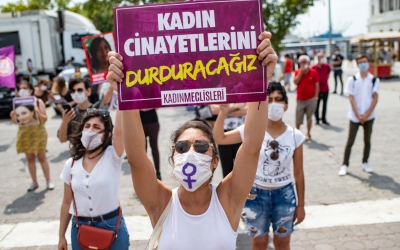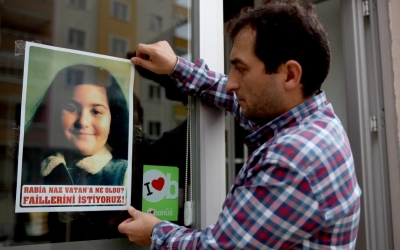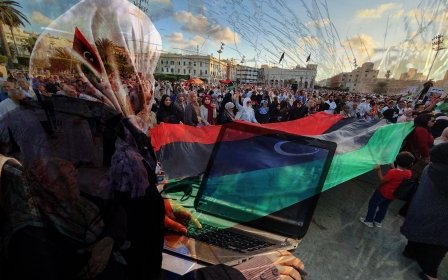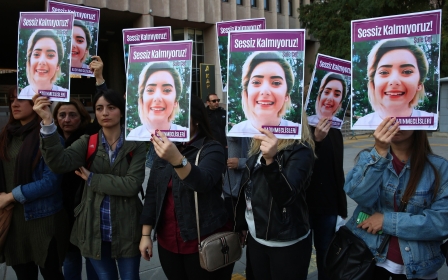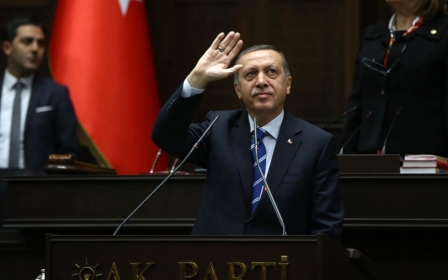Anger as Turkey quits European treaty on violence against women
Thousands protested in Turkey on Saturday calling for President Recep Tayyip Erdogan to reverse his decision to withdraw from the world's first binding treaty to prevent and combat violence against women.
The government sparked domestic and international outrage after announcing the decision before dawn on Saturday, the latest victory for conservatives in Erdogan's nationalist party and their allies who argued the treaty damaged family unity.
The 2011 Istanbul Convention, signed by 45 countries and the European Union, requires governments to adopt legislation prosecuting domestic violence and similar abuse as well as marital rape and female genital mutilation.
"Reverse your decision, apply the treaty!" chanted thousands of people during a protest in the Kadikoy neighbourhood on the Asian side of Istanbul on Saturday.
The protesters held up portraits of women murdered in Turkey, one reading: "It is women who will win this war."
One protester, who gave her name as Banu, said she was "fed up with the patriarchal state".
"I'm fed with not feeling safe. Enough!" she told AFP.
Other smaller protests were held in the capital Ankara and the southwestern city of Izmir, according to media reports.
Despite rising murders of women in recent years, Turkey announced late on Friday it had withdrawn from the 2011 Istanbul Convention, which was the world's first binding agreement to protect women from violence.
"The Istanbul Convention... is widely regarded as the gold standard in international efforts to protect women and girls from the violence that they face every day in our societies," said Marija Pejcinovic Buric, the secretary-general of the Council of Europe, which oversees the accord.
"This move is a huge setback to these efforts and all the more deplorable because it compromises the protection of women in Turkey, across Europe and beyond."
Turkey pulled out of the treaty by presidential decree, without giving a reason.
Zehra Zumrut, Turkey's family, labour and social policies minister, said on Twitter that the country's own existing laws were strong enough to protect women.
Hostile to principle of gender equality
Many conservatives in Turkey say the pact undermines family structures, encouraging violence. They are also hostile to the principle of gender equality in the Istanbul Convention and see it as promoting homosexuality, given its principle of non-discrimination on grounds of sexual orientation.
"Preserving our traditional social fabric" will protect the dignity of Turkish women, Vice President Fuat Oktay said on Twitter.
"For this sublime purpose, there is no need to seek the remedy outside or to imitate others."
Critics of the withdrawal from the pact have said it will put Turkey further out of step with the values of the European Union, which it remains a candidate to join.
They argue that the convention, and legislation approved in its wake, need to be implemented more stringently.
Turkey is not the first country to move towards ditching the accord.
Poland's highest court scrutinised the pact after a cabinet member said Warsaw should quit the treaty, which the nationalist government considers too liberal.
'Shame on this bigotry'
Turkey does not keep official statistics on femicide. World Health Organisation data have shown 38 percent of women in Turkey are subject to violence from a partner in their lifetime, compared to about 25 percent in Europe.
"Shame on this bigotry, patriarchy, heartlessness that protects bullies and murderers instead of women," renowned Turkish author Elif Shafak said on Twitter of the withdrawal.
Germany said that Turkey's decision sent the wrong signal.
"Neither cultural nor religious nor other national traditions can serve as an excuse for ignoring violence against women," the German foreign ministry said in a statement.
France's foreign affairs ministry said on Saturday that it deeply regretted Turkey's decision to quit the accord and that the move marked a new regression in terms of respect for human rights.
"This decision will primarily affect Turkish women, to whom France expresses all its solidarity," the French ministry said in a statement.
Istanbul's mayor Ekrem Imamoglu, of the main opposition CHP party, said ditching the pact was "painful" and disregards women's struggle over years.
While critics say his government has not done enough, Erdogan has condemned violence against women and said this month it would work to eradicate it.
Ankara has tagged men known to resort to violence and created a popular smartphone app for women to alert police.
Middle East Eye propose une couverture et une analyse indépendantes et incomparables du Moyen-Orient, de l’Afrique du Nord et d’autres régions du monde. Pour en savoir plus sur la reprise de ce contenu et les frais qui s’appliquent, veuillez remplir ce formulaire [en anglais]. Pour en savoir plus sur MEE, cliquez ici [en anglais].


